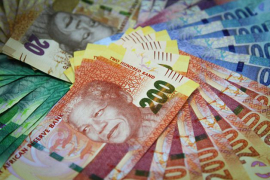
South Africa’s gross domestic product (GDP) increased by 1.6% between July and September, Deputy Director General for Economic Statistics, Joe de Beer, announced on Tuesday.
The main attributors, Statistics South Africa (Stats SA) said, were the agriculture, forestry and fishing industries, which increased by 19.2% in the third quarter, contributing 0.5 of a percentage point to GDP growth.
During this period, said Stats SA, increased economic activities were reported for field crops and horticulture products.
“Finance, real estate and business services increased at a rate of 1.9% in the third quarter, contributing 0.5 of a percentage point to GDP growth. Increased economic activity was reported for financial intermediation, insurance and pension funding, auxiliary activities, real estate activities and other business services.
“The transport, storage and communication industry increased by 3.7%, contributing 0.3 of a percentage point. Increased economic activities were reported for land transport, transport support services and communication services,” said de Beer.
Stats SA said the manufacturing industry during this period increased by 1.5%, contributing 0.2 of a percentage point to GDP growth.
“Seven of the 10 manufacturing divisions reported positive growth rates in the third quarter. The motor vehicles, parts and accessories and other transport equipment division made the largest contribution to the increase in the third quarter.
"The food and beverages division and the basic iron and steel, non-ferrous metal products, metal products and machinery division also made significant contributions to growth.
“The unadjusted real GDP at market prices for the first nine months of 2022 increased by 2.3% compared with the first nine months of 2021,” Stats SA said in a statement.
Expenditure on GDP
Expenditure on real gross domestic product increased by 1.6% in the third quarter of 2022, the agency said.
Household final consumption expenditure decreased by 0.3% in the third quarter, contributing -0.2 of a percentage point to total growth. The largest contribution to negative growth was non-durable goods.
Stats SA said the main contributors to the decline in household final consumption expenditure (HFCE) were expenditures in the ‘other’ category (-3.8%, contributing -0.5 of a percentage point), food and non-alcoholic beverages (-0.9%, contributing -0.1 of a percentage point) and recreation and culture (-1.6%, contributing -0.1 of a percentage point).
Expenditure on restaurants, transport and housing contributed positively to growth in HFCE in the third quarter.
Final consumption expenditure by general government increased by 0.5% in the third quarter, mainly driven by increases in goods and services.
Total gross fixed capital formation increased by 0.3%. The main contributors to the increase were residential buildings (11.0%, contributing 1.4 percentage points) and transport equipment (11.0%, contributing 1.1 percentage points).
“There was a R63 billion build-up of inventories in the third quarter of 2022 (seasonally adjusted and annualised value). Large increases in three industries contributed to the inventory build-up, namely trade, catering and accommodation; transport, storage and communication; and mining and quarrying.
“Net exports contributed positively to growth in expenditure on GDP in the third quarter. Exports of goods and services increased by 4.2%, largely influenced by increased trade in mineral products; base metals and articles of base metals; vegetable products; and paper products,” Stats SA said.
Imports of goods and services increased by 0.6%, driven largely by increases in mineral products and animal and vegetable fats and oils. – SAnews.gov.za


